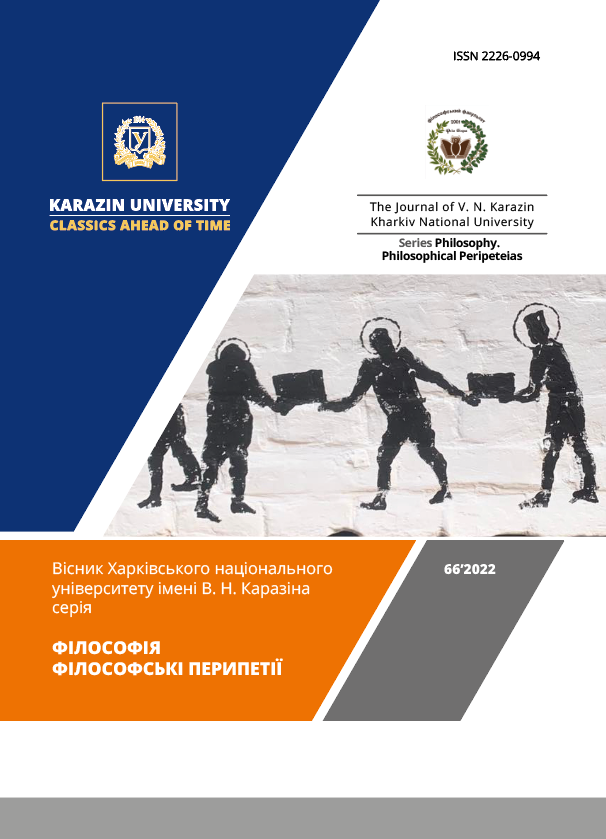NEW SINCERITY IN POST-POSTMODERN ART
Abstract
This article explores an issue of New Sincerity in post-postmodern context, in post-postmodern culture uppermost and in literature in the first instance. The research considers post-postmodern New Sincerity in comparison with postmodern apathy, redundant intellectualization and quotation, etc. In such a case New Sincerity is closely related to post-postmodern genuineness, authenticity, honesty, veracity, earnest and seriousness. Postmodern ironical eclecticism as a kind of deconstruction develops in reconstructive post-postmodern non- and metafiction sincerity. Therefore, New Sincerity as a sensitivity appears both as a general cultural atmosphere and a certain kind of philosophy with its peculiar aesthetics, ethics, ontology, etc. For example, the category of beauty realizes in post-postmodern aesthetics in a connection with a more sincere perception and feeling of art and nature. The article investigates the differences between New Sincerity and postirony and New Sincerity turns out to be not so much ironic as humorous. The exploration of New Sincerity takes place in its main part on the material of post-postmodern literature, which in the best way combines conceptualizing and perceptualizing. However, in its most actual manifestations, New Sincerity in connection with postirony appears at the intersection of theory, literature, movie, rock, network and mem-art, etc. In all cases, an appeal to vernacular culture allows for conveying a private experience. In such a context post-postmodern art become more sincere than postmodern one. Rude jokes or mundane activity, traumatic or banal contribute to the achievement of a greater degree of intimacy and love than overly straightforward tolerance. The reason for this is postironical supposition, that irony ironizes itself and became self-referential and hence therapeutical and joyful. Thus, New Sincerity appeals to the interconnection of seriousness and postironic humor, depth and superficies. In conclusion, the article stresses the significance of New Sincerity for post-postmodern aesthetics and ethics. With its help a possibility of sappy personal utterance and access to the Real, lost in the postmodern condition, appears again, renewed and enriched.
Downloads
References
Collins, J. (1993). Genericity in the Nineties: Eclectic Irony and the New Sincerity. In Collins J., Radner H., and Preacher A. (Eds.), Film Theory Goes to the Movies, (pp. 242–263). New York: Routledge.
Collins, M. (2010). Post-irony is real, and so what? The Georgetown Voice, March 4. Retrieved from https://georgetownvoice.com/2010/03/04/post-irony-is-real-and-so-what/
Danielewski, Mark Z. (2000). House of Leaves. New York: Pantheon Books, Random House.
Deleuze, G. (1991). Coldness and Cruelty. New York: Zone Books.
Diakoulakis, Ch. (2010). “Quote unquote love... a type of scotopia”: David Foster Wallace’s Brief Interviews with Hideous Men. In D. Hering (Ed.), Consider David Foster Wallace: Critical Essays, (pp. 147–155). Austin: SSMG.
Duncan, A. (2018). Post-Ironic Humour. Lacanian Review Online. September, 2nd. Retrieved from https://www.thelacanianreviews.com/post-ironic-humour/
Dore, F. (2013) The Rock Novel and Jonathan Lethem’s The Fortress of Solitude. nonsite.org, Issue #8: The Music Issue, January 20. Retrieved from https://nonsite.org/the-rock-novel-and-jonathan-lethems-the-fortress-of-solitude/#foot_20-4928
Hoffmann, L. (2016). Postirony: The Nonfictional Literature of David Foster Wallace and Dave Eggers. Bielefeld: transcript Verlag.
Kelly, A. (2010). David Foster Wallace and the New Sincerity in American Fiction In D. Hering (Ed.), Consider David Foster Wallace: Critical Essays, (pp. 131–146). Austin: SSMG.
Konstantinou, L. (2017). Four Faces of Postirony. In R. Van den Akker, Α. Gibbons, T. Vermeulen (Eds.). Metamodernism: Historicity, Affect, and Depth after Postmodernism, (pp. 87–102). Lanham: Rowman & Littlefield.
McLaughlin, R. L. (2012.) Post-postmodernism. In J. Bray, A. Gibbons and B. McHale (Eds.), The Routledge Companion to Experimental Literature, (pp. 212–223). London and New York, NY: Routledge.
Nixon, Ch. R. (2013). The work of David Foster Wallace and post-postmodernism [Unpublished doctoral dissertation]. The University of Leeds. Retrieved from https://etheses.whiterose.ac.uk/6873/1/DFW%20and%20post-postmodernism.pdf
Pokalchuk, Yu. (1995). Postmodernist Novel in French Literature, or Neoclassicism of Frédéric Tristan’s Works. Universe, 7, 158–161.
Scarry, E. (1999). On Beauty and Being Just. Princeton, Oxford: Princeton University Press.
Timmer, N. (2010). Do You Feel It Too? The Post-Postmodern Syndrome in American Fiction at the Turn of the Millennium. Amsterdam, New York: Rodopi.
Tristan, F. (2000). Les égarés. Paris: Fayard. Kindle edition.
Wallace, D. F. (2005). Consider the Lobster and Other Essays. New York, Boston:
Little, Brown and Company.
Žižek, S. (2012). Less than nothing: Hegel and the shadow of dialectical materialism. London: Verso.
Zupancic, A. (2003). On Love as Comedy. Journal for Politics, Gender and Culture. Vol. II, 1, Summer, 61–80.
Copyright (c) 2022 Наталія Загурська

This work is licensed under a Creative Commons Attribution 4.0 International License.
Authors who publish with this journal agree to the following terms:
- Authors retain copyright and grant the journal right of first publication of this work under the terms of a license Creative Commons Attribution License 4.0 International (CC BY 4.0).
- Authors are able to enter into separate, additional contractual arrangements for the non-exclusive distribution of the journal's published version of the work (e.g., post it to an institutional repository or publish it in a book), with an acknowledgement of its initial publication in this journal.
- Authors are permitted and encouraged to post their work online (e.g., in institutional repositories or on their website) prior to and during the submission process, as it can lead to productive exchanges, as well as earlier and greater citation of published work.






3.gif)




